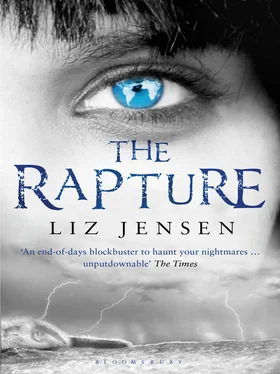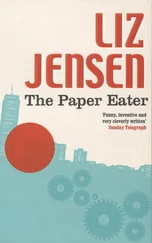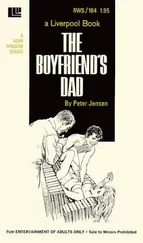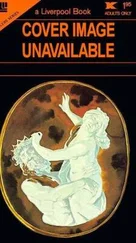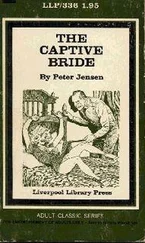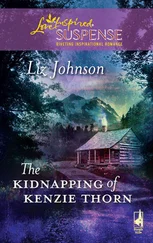There is an age past which a woman should have stopped caring about chattels, objects of sentimental value, bibelots. But clearly I have not reached it yet, because in the rushed departure from the farmhouse, I left my favourite Frida Kahlo book on the table and now that I have vomited out of the opened door and recovered what dignity I can, its absence is gnawing at me. It’s as though I have betrayed someone who matters, and I can never make it up to them. To quell the creeping paranoia, I gaze on what comforts me. The cheekbone I love to bite when we make love. His strong nose. The stubble reappearing, the red of oxidised soil. He wiped my mouth, he gave me water, he hugged me tight and kissed my face even though I had just puked. I put my hand back on his thigh, where it belongs, and he covers it with his own. I feel infinite gratitude. But it doesn’t stop the fear sliding back. If now were a time for escapist fantasies born of sheer blue funk, I would put us on the shore of a river. Let’s say the Severn, somewhere near Bristol. It would be late spring. There would be dragonflies, kayaks, long lazy filaments of weed. The meadow behind us would be dotted with poppies and Michaelmas daisies and buttercups. Perhaps there is enough telepathy between us that unsaid things can be left unsaid.
‘Name the first river that comes into your head.’
He smiles tightly. ‘The Nile.’
Incorrect answer. That means we’ll die. ‘What’s wrong with the Severn?’
‘Nothing’s wrong with the Severn. But I thought of the Nile. Now it’s my turn to be ridiculous. Name a lake.’
‘Titicaca.’
‘No. Lake Powell. Which straddles Utah and Arizona, in case you didn’t know.’
I didn’t. I have never heard of Lake Powell. So that’s it. We will definitely die . ‘This can’t be the first time people have believed Armageddon was approaching.’ My voice sounds fake and chirpy. ‘Think about Carthage. The Great Plague. The Lisbon earthquake in seventeen something-or-other. Hiroshima.’
‘Noah’s flood. The birth of survivalism and an object lesson in the advantages of forward planning.’ His voice sounds fake and chirpy too. Which means he is playing my game. Is that good or bad? ‘Isaac Newton believed the world would end in 2060. But when people say "the world", they really mean our world.’ Yes: he’s concentrating on sounding normal. But like me, he’s failing. ‘The world as we know it. Geologically speaking, it’s just business as usual. One era comes to an abrupt end, the biosphere takes a severe knock, and a new era begins.’
‘The reign of the Antichrist,’ belches Bethany from the back seat. ‘The dominion of the Beast.’
The storm begins with a smatter of rain on the windscreen and a wash of freezing air bearing the dark organic stench of enzymes attacking proteins, of fish innards, of kelp and mud and bladder-wrack. Pewter clouds wheel in from the horizon. The sea has turned restless and choppy, and in the distance a white-yellow flash of lightning breaches the sky, silhouetting radio masts, telegraph poles, and the spectral skeletons of trees. Seconds later comes a gurgle of thunder. We’re now somewhere north of a residential suburb of Felixstowe where the plane trees have been pruned into arthritic fists. We’re still more than a hundred kilometres from London. Raindrops thwack at the windscreen and dribble sideways. Bethany rolls her window down and thrusts her head out to inhale the loaded, stinking air. It punches its way into the car like something alive.
‘I can feel the volts!’ she calls. Then addresses the sky. ‘Hey, bring it on!’
‘Close the window!’ roars Frazer Melville. Ignoring him, Bethany starts rocking on the back seat, humming loud and open-mouthed, the way a baby will test its voice for rowdiness: an experiment in noise-production.
‘Storms agitate her.’ I’m remembering Oxsmith. ‘We need to park somewhere and call her down.’
The stench is so dense I can taste it on my tongue. In the back seat, Bethany’s eyes are glittering darkly, as though she is watching a dangerous stage show beyond an invisible curtain. She leans out of the window and yells into the gusting rain: ‘And there shall come a rushing as of a mighty wind! And there shall come electricity! And the righteous shall be caught up together with them in the clouds to meet the Lord in the air!’
‘Hey, Bethany, shut the window, I’m trying to drive a car here!’ snaps Frazer Melville. A line of sweat is running down the side of his face and into the collar of his shirt. I glance back at Bethany. She is fighting the buckle of her seat belt.
‘Pull over right away. Bethany, it’s OK. You’ll be OK,’ I say.
But she won’t be OK. There was never going to be a time when she would be. She unstraps her belt and flings it off. Then with an ecstatic cry, she has yanked open the door and hurled herself out.
Frazer Melville twists the steering wheel and swerves the car into the pavement where it stalls, skewed half on the road, half off. My mouth is wide open so I must have screamed. Bethany’s door gapes open to the pavement and rain lashes in, darkening the seat. Cars honk furiously as they swerve past. Ahead, there’s no sign of Bethany. Then, in the wing-mirror, I see an outline and something fights in my throat. She’s spread-eagled on the pavement behind us, motionless.
With forensic clarity, I picture her broken spine. Specifically, the smashed vertebrae. The break is at T3 level. Maybe T9. The nightmare springs to violent life. My heart volleys with blood.
But a second later — the relief is disorienting — she has jumped to her feet as though nothing has happened, and she’s running past us and up a side-street across the road to the left, her giant black T-shirt flapping loosely. I wonder vaguely if someone might have called the police. And whether, in this moment, it might even be a blessing if they came. Up ahead, fork lightning divides the sky, followed immediately by a ferocious thunderclap, shockingly close. The storm is right overhead.
‘I,m going after her,’ mutters Frazer Melville, flinging open his door to another blare of horns. In a second, he’s out. I call after him but he is gone, swallowed into the storm’s murk.
The rain is still whipping in through the open back door, flooding the seat. I reach over to the controls and turn on the hazard lights. A young man curses me in Urdu before revving off into the storm. Out of reach of my wheelchair, I am helpless. I can’t even close the back door from where I’m sitting. The wet air seethes like a putrid stew. To my left, I can just make out Bethany’s tiny black silhouette. Frazer Melville is running after her. They’ve taken a side-street flanked with plane trees, where three young children are splashing in the downpour. There’s a blond man, perhaps their father, in the covered driveway, fixing his car. He straightens up to watch the stubble-headed Goth kid rush past at full-tilt, followed by the big man in shirtsleeves, soaked to the skin, shouting wildly.
Then I see where Bethany is headed. There is a horrible logic to it.
On a patch of wilderness beyond the road, the pylon stands tall as an eight-storey building.
I roll down the window and honk the car horn until the blond man turns. He’s in his thirties, wearing an oil-stained sweatshirt with a hood. Chest-hair sprouts out of the top. ‘Please come here, I need your help!’ I yell through the whipping wind. He glares at me accusingly, then glances back at Bethany and Frazer Melville, who are now halfway to the pylon, and shouts at the kids in a language that sounds Slavic. They ignore him. He shouts again, more brutally, and they run inside the house. Another lightning flash splits the sky in two. I try to indicate I can’t move, grinning at him desperately, as animals do when cornered by a predator. Finally, with reluctance, the man ducks his head into the rain and runs over. The next thunderclap resounds with a series of crashes like hurled crockery.
Читать дальше
